Child Development Report: Stages, Evaluation, and Interventions
VerifiedAdded on 2023/06/06
|9
|2686
|120
Report
AI Summary
This report provides a comprehensive overview of child development, encompassing physical, socio-emotional, and cognitive milestones. It details the evaluation of these developmental stages, discussing aspects like motor skills, emotional regulation, and cognitive abilities. The report emphasizes the importance of early interventions to support learning and address developmental delays, including occupational, speech, and psychological therapies. It highlights how early interventions can improve children's academic performance, mental health, and social skills, while also addressing factors that may threaten developmental stages. The report also stresses the role of parental mental health and protective factors in fostering positive outcomes. The report is a valuable resource for understanding child development and the crucial role of early intervention strategies.
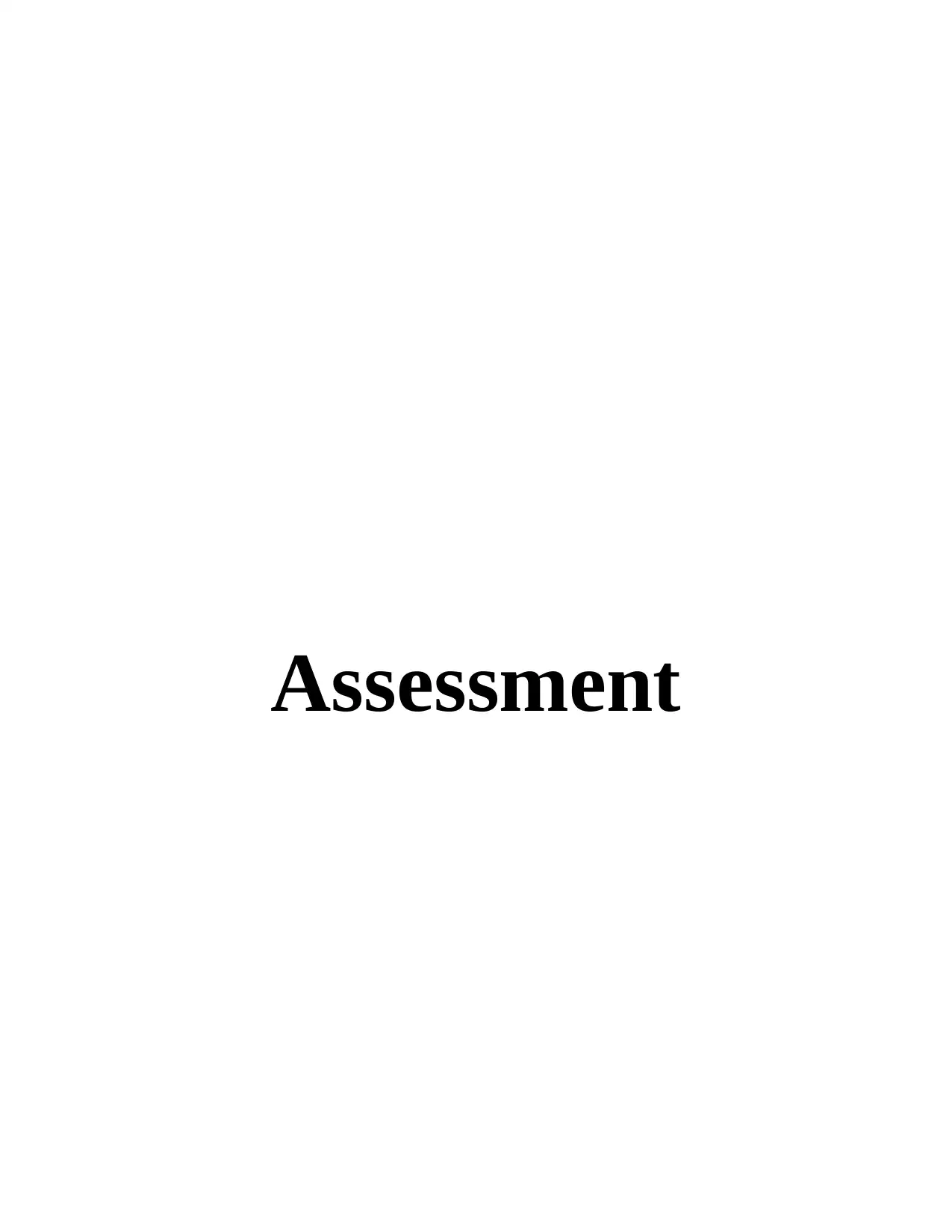
Assessment
Paraphrase This Document
Need a fresh take? Get an instant paraphrase of this document with our AI Paraphraser
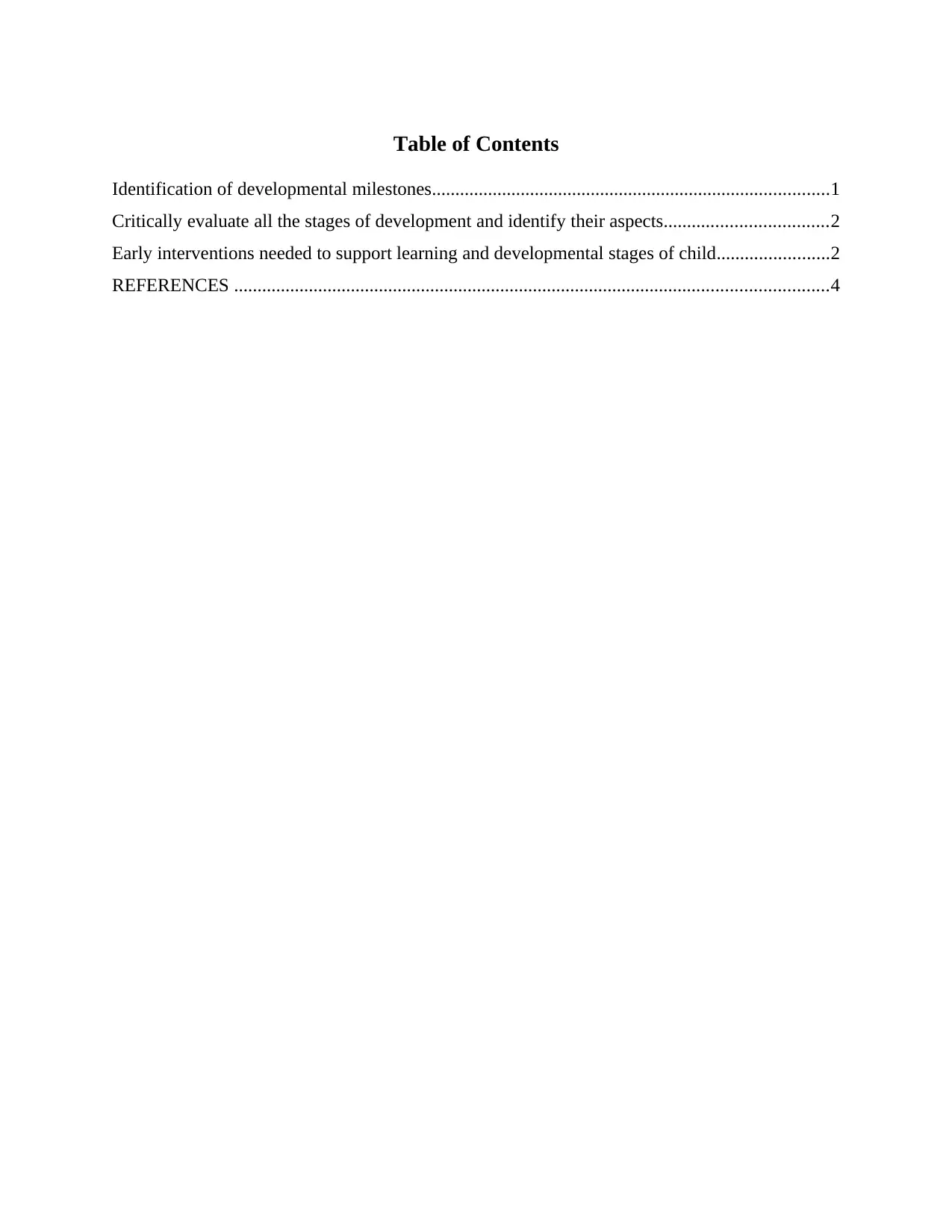
Table of Contents
Identification of developmental milestones.....................................................................................1
Critically evaluate all the stages of development and identify their aspects...................................2
Early interventions needed to support learning and developmental stages of child........................2
REFERENCES ...............................................................................................................................4
Identification of developmental milestones.....................................................................................1
Critically evaluate all the stages of development and identify their aspects...................................2
Early interventions needed to support learning and developmental stages of child........................2
REFERENCES ...............................................................................................................................4
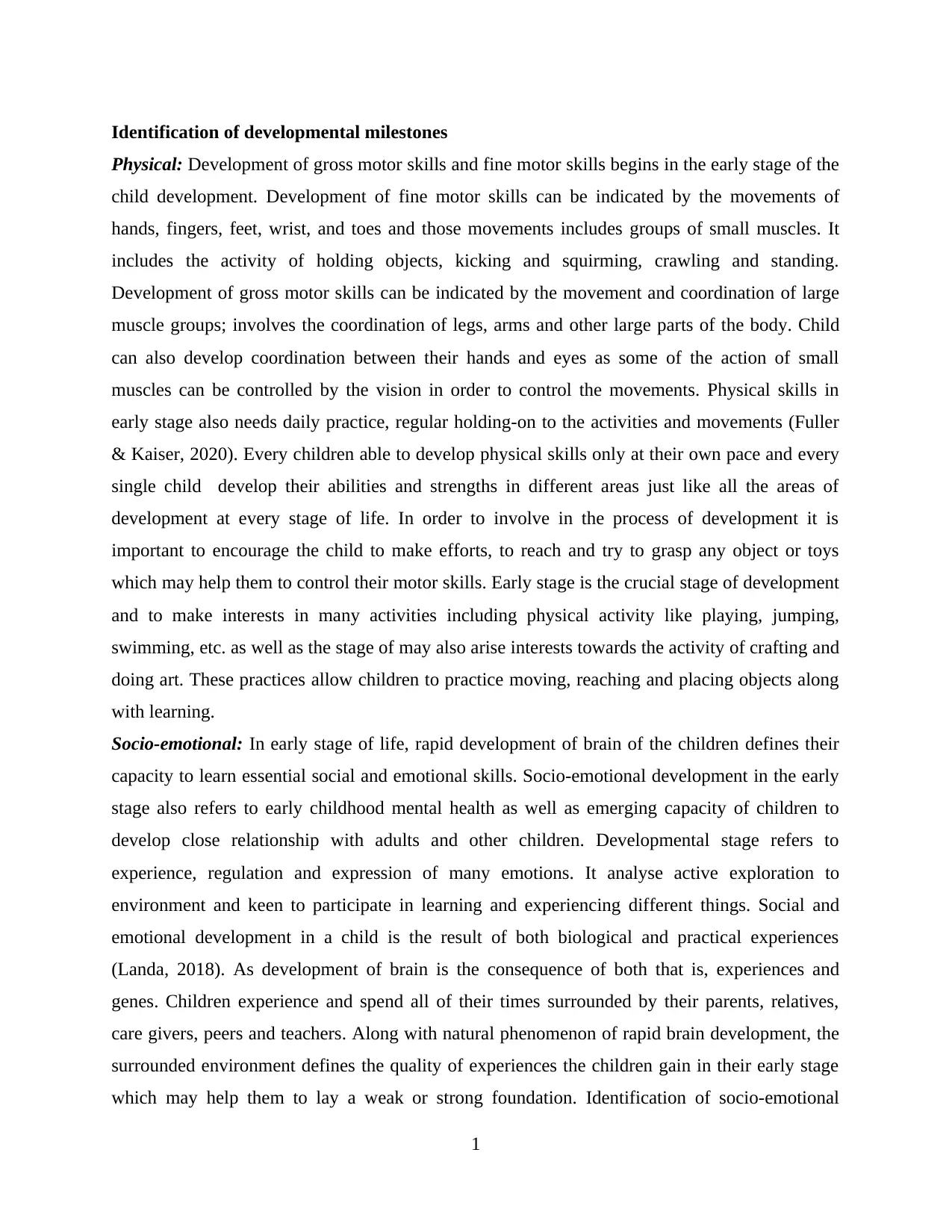
Identification of developmental milestones
Physical: Development of gross motor skills and fine motor skills begins in the early stage of the
child development. Development of fine motor skills can be indicated by the movements of
hands, fingers, feet, wrist, and toes and those movements includes groups of small muscles. It
includes the activity of holding objects, kicking and squirming, crawling and standing.
Development of gross motor skills can be indicated by the movement and coordination of large
muscle groups; involves the coordination of legs, arms and other large parts of the body. Child
can also develop coordination between their hands and eyes as some of the action of small
muscles can be controlled by the vision in order to control the movements. Physical skills in
early stage also needs daily practice, regular holding-on to the activities and movements (Fuller
& Kaiser, 2020). Every children able to develop physical skills only at their own pace and every
single child develop their abilities and strengths in different areas just like all the areas of
development at every stage of life. In order to involve in the process of development it is
important to encourage the child to make efforts, to reach and try to grasp any object or toys
which may help them to control their motor skills. Early stage is the crucial stage of development
and to make interests in many activities including physical activity like playing, jumping,
swimming, etc. as well as the stage of may also arise interests towards the activity of crafting and
doing art. These practices allow children to practice moving, reaching and placing objects along
with learning.
Socio-emotional: In early stage of life, rapid development of brain of the children defines their
capacity to learn essential social and emotional skills. Socio-emotional development in the early
stage also refers to early childhood mental health as well as emerging capacity of children to
develop close relationship with adults and other children. Developmental stage refers to
experience, regulation and expression of many emotions. It analyse active exploration to
environment and keen to participate in learning and experiencing different things. Social and
emotional development in a child is the result of both biological and practical experiences
(Landa, 2018). As development of brain is the consequence of both that is, experiences and
genes. Children experience and spend all of their times surrounded by their parents, relatives,
care givers, peers and teachers. Along with natural phenomenon of rapid brain development, the
surrounded environment defines the quality of experiences the children gain in their early stage
which may help them to lay a weak or strong foundation. Identification of socio-emotional
1
Physical: Development of gross motor skills and fine motor skills begins in the early stage of the
child development. Development of fine motor skills can be indicated by the movements of
hands, fingers, feet, wrist, and toes and those movements includes groups of small muscles. It
includes the activity of holding objects, kicking and squirming, crawling and standing.
Development of gross motor skills can be indicated by the movement and coordination of large
muscle groups; involves the coordination of legs, arms and other large parts of the body. Child
can also develop coordination between their hands and eyes as some of the action of small
muscles can be controlled by the vision in order to control the movements. Physical skills in
early stage also needs daily practice, regular holding-on to the activities and movements (Fuller
& Kaiser, 2020). Every children able to develop physical skills only at their own pace and every
single child develop their abilities and strengths in different areas just like all the areas of
development at every stage of life. In order to involve in the process of development it is
important to encourage the child to make efforts, to reach and try to grasp any object or toys
which may help them to control their motor skills. Early stage is the crucial stage of development
and to make interests in many activities including physical activity like playing, jumping,
swimming, etc. as well as the stage of may also arise interests towards the activity of crafting and
doing art. These practices allow children to practice moving, reaching and placing objects along
with learning.
Socio-emotional: In early stage of life, rapid development of brain of the children defines their
capacity to learn essential social and emotional skills. Socio-emotional development in the early
stage also refers to early childhood mental health as well as emerging capacity of children to
develop close relationship with adults and other children. Developmental stage refers to
experience, regulation and expression of many emotions. It analyse active exploration to
environment and keen to participate in learning and experiencing different things. Social and
emotional development in a child is the result of both biological and practical experiences
(Landa, 2018). As development of brain is the consequence of both that is, experiences and
genes. Children experience and spend all of their times surrounded by their parents, relatives,
care givers, peers and teachers. Along with natural phenomenon of rapid brain development, the
surrounded environment defines the quality of experiences the children gain in their early stage
which may help them to lay a weak or strong foundation. Identification of socio-emotional
1
⊘ This is a preview!⊘
Do you want full access?
Subscribe today to unlock all pages.

Trusted by 1+ million students worldwide
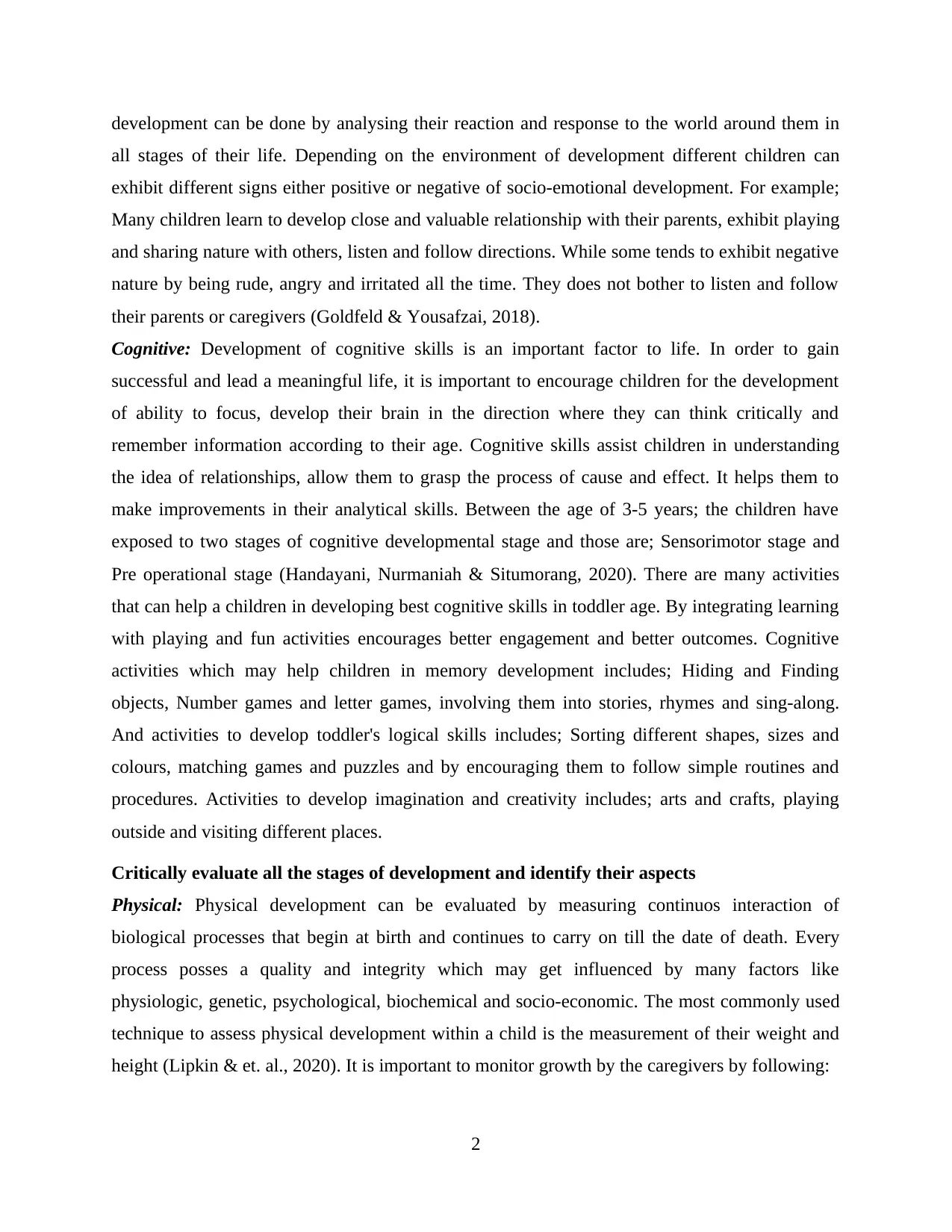
development can be done by analysing their reaction and response to the world around them in
all stages of their life. Depending on the environment of development different children can
exhibit different signs either positive or negative of socio-emotional development. For example;
Many children learn to develop close and valuable relationship with their parents, exhibit playing
and sharing nature with others, listen and follow directions. While some tends to exhibit negative
nature by being rude, angry and irritated all the time. They does not bother to listen and follow
their parents or caregivers (Goldfeld & Yousafzai, 2018).
Cognitive: Development of cognitive skills is an important factor to life. In order to gain
successful and lead a meaningful life, it is important to encourage children for the development
of ability to focus, develop their brain in the direction where they can think critically and
remember information according to their age. Cognitive skills assist children in understanding
the idea of relationships, allow them to grasp the process of cause and effect. It helps them to
make improvements in their analytical skills. Between the age of 3-5 years; the children have
exposed to two stages of cognitive developmental stage and those are; Sensorimotor stage and
Pre operational stage (Handayani, Nurmaniah & Situmorang, 2020). There are many activities
that can help a children in developing best cognitive skills in toddler age. By integrating learning
with playing and fun activities encourages better engagement and better outcomes. Cognitive
activities which may help children in memory development includes; Hiding and Finding
objects, Number games and letter games, involving them into stories, rhymes and sing-along.
And activities to develop toddler's logical skills includes; Sorting different shapes, sizes and
colours, matching games and puzzles and by encouraging them to follow simple routines and
procedures. Activities to develop imagination and creativity includes; arts and crafts, playing
outside and visiting different places.
Critically evaluate all the stages of development and identify their aspects
Physical: Physical development can be evaluated by measuring continuos interaction of
biological processes that begin at birth and continues to carry on till the date of death. Every
process posses a quality and integrity which may get influenced by many factors like
physiologic, genetic, psychological, biochemical and socio-economic. The most commonly used
technique to assess physical development within a child is the measurement of their weight and
height (Lipkin & et. al., 2020). It is important to monitor growth by the caregivers by following:
2
all stages of their life. Depending on the environment of development different children can
exhibit different signs either positive or negative of socio-emotional development. For example;
Many children learn to develop close and valuable relationship with their parents, exhibit playing
and sharing nature with others, listen and follow directions. While some tends to exhibit negative
nature by being rude, angry and irritated all the time. They does not bother to listen and follow
their parents or caregivers (Goldfeld & Yousafzai, 2018).
Cognitive: Development of cognitive skills is an important factor to life. In order to gain
successful and lead a meaningful life, it is important to encourage children for the development
of ability to focus, develop their brain in the direction where they can think critically and
remember information according to their age. Cognitive skills assist children in understanding
the idea of relationships, allow them to grasp the process of cause and effect. It helps them to
make improvements in their analytical skills. Between the age of 3-5 years; the children have
exposed to two stages of cognitive developmental stage and those are; Sensorimotor stage and
Pre operational stage (Handayani, Nurmaniah & Situmorang, 2020). There are many activities
that can help a children in developing best cognitive skills in toddler age. By integrating learning
with playing and fun activities encourages better engagement and better outcomes. Cognitive
activities which may help children in memory development includes; Hiding and Finding
objects, Number games and letter games, involving them into stories, rhymes and sing-along.
And activities to develop toddler's logical skills includes; Sorting different shapes, sizes and
colours, matching games and puzzles and by encouraging them to follow simple routines and
procedures. Activities to develop imagination and creativity includes; arts and crafts, playing
outside and visiting different places.
Critically evaluate all the stages of development and identify their aspects
Physical: Physical development can be evaluated by measuring continuos interaction of
biological processes that begin at birth and continues to carry on till the date of death. Every
process posses a quality and integrity which may get influenced by many factors like
physiologic, genetic, psychological, biochemical and socio-economic. The most commonly used
technique to assess physical development within a child is the measurement of their weight and
height (Lipkin & et. al., 2020). It is important to monitor growth by the caregivers by following:
2
Paraphrase This Document
Need a fresh take? Get an instant paraphrase of this document with our AI Paraphraser
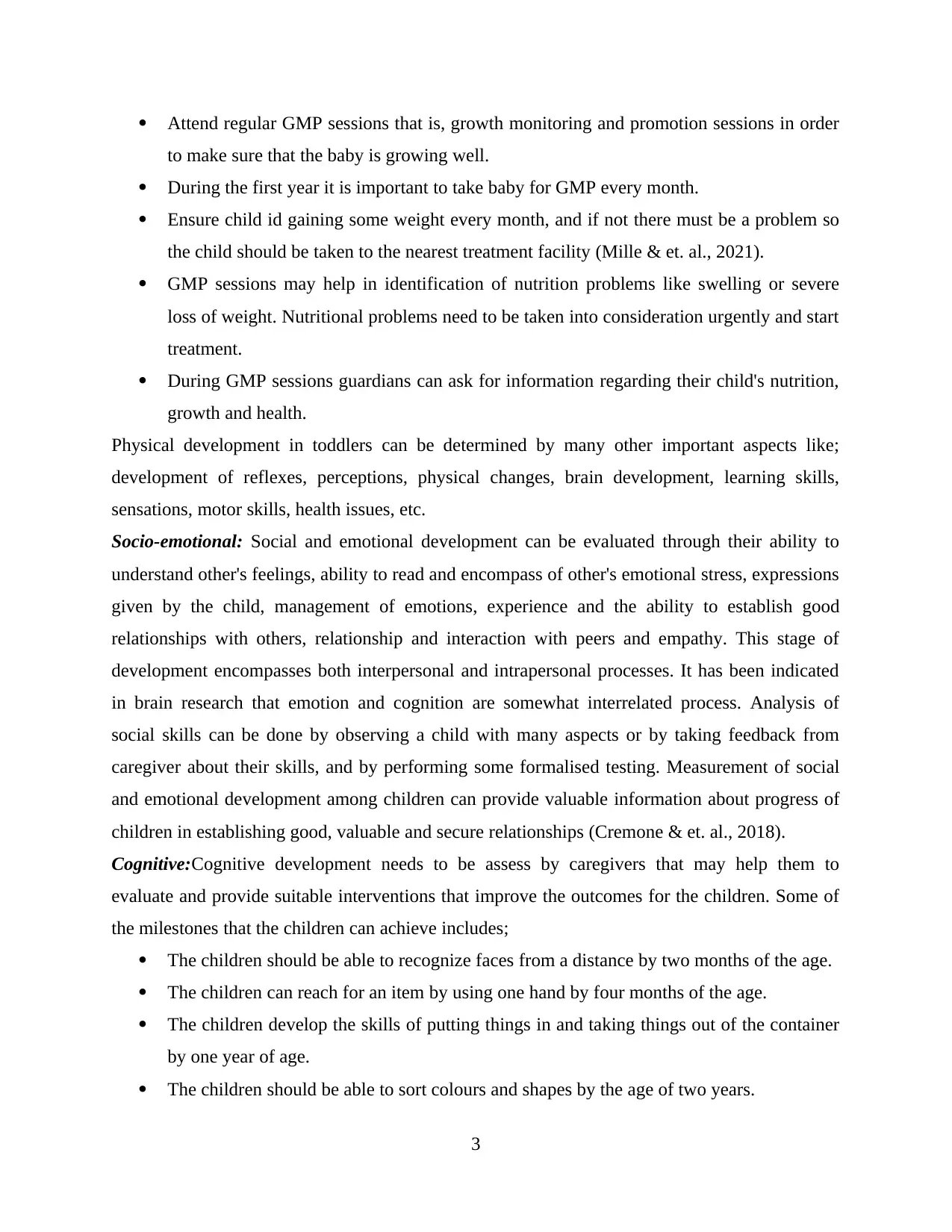
Attend regular GMP sessions that is, growth monitoring and promotion sessions in order
to make sure that the baby is growing well.
During the first year it is important to take baby for GMP every month.
Ensure child id gaining some weight every month, and if not there must be a problem so
the child should be taken to the nearest treatment facility (Mille & et. al., 2021).
GMP sessions may help in identification of nutrition problems like swelling or severe
loss of weight. Nutritional problems need to be taken into consideration urgently and start
treatment.
During GMP sessions guardians can ask for information regarding their child's nutrition,
growth and health.
Physical development in toddlers can be determined by many other important aspects like;
development of reflexes, perceptions, physical changes, brain development, learning skills,
sensations, motor skills, health issues, etc.
Socio-emotional: Social and emotional development can be evaluated through their ability to
understand other's feelings, ability to read and encompass of other's emotional stress, expressions
given by the child, management of emotions, experience and the ability to establish good
relationships with others, relationship and interaction with peers and empathy. This stage of
development encompasses both interpersonal and intrapersonal processes. It has been indicated
in brain research that emotion and cognition are somewhat interrelated process. Analysis of
social skills can be done by observing a child with many aspects or by taking feedback from
caregiver about their skills, and by performing some formalised testing. Measurement of social
and emotional development among children can provide valuable information about progress of
children in establishing good, valuable and secure relationships (Cremone & et. al., 2018).
Cognitive:Cognitive development needs to be assess by caregivers that may help them to
evaluate and provide suitable interventions that improve the outcomes for the children. Some of
the milestones that the children can achieve includes;
The children should be able to recognize faces from a distance by two months of the age.
The children can reach for an item by using one hand by four months of the age.
The children develop the skills of putting things in and taking things out of the container
by one year of age.
The children should be able to sort colours and shapes by the age of two years.
3
to make sure that the baby is growing well.
During the first year it is important to take baby for GMP every month.
Ensure child id gaining some weight every month, and if not there must be a problem so
the child should be taken to the nearest treatment facility (Mille & et. al., 2021).
GMP sessions may help in identification of nutrition problems like swelling or severe
loss of weight. Nutritional problems need to be taken into consideration urgently and start
treatment.
During GMP sessions guardians can ask for information regarding their child's nutrition,
growth and health.
Physical development in toddlers can be determined by many other important aspects like;
development of reflexes, perceptions, physical changes, brain development, learning skills,
sensations, motor skills, health issues, etc.
Socio-emotional: Social and emotional development can be evaluated through their ability to
understand other's feelings, ability to read and encompass of other's emotional stress, expressions
given by the child, management of emotions, experience and the ability to establish good
relationships with others, relationship and interaction with peers and empathy. This stage of
development encompasses both interpersonal and intrapersonal processes. It has been indicated
in brain research that emotion and cognition are somewhat interrelated process. Analysis of
social skills can be done by observing a child with many aspects or by taking feedback from
caregiver about their skills, and by performing some formalised testing. Measurement of social
and emotional development among children can provide valuable information about progress of
children in establishing good, valuable and secure relationships (Cremone & et. al., 2018).
Cognitive:Cognitive development needs to be assess by caregivers that may help them to
evaluate and provide suitable interventions that improve the outcomes for the children. Some of
the milestones that the children can achieve includes;
The children should be able to recognize faces from a distance by two months of the age.
The children can reach for an item by using one hand by four months of the age.
The children develop the skills of putting things in and taking things out of the container
by one year of age.
The children should be able to sort colours and shapes by the age of two years.
3
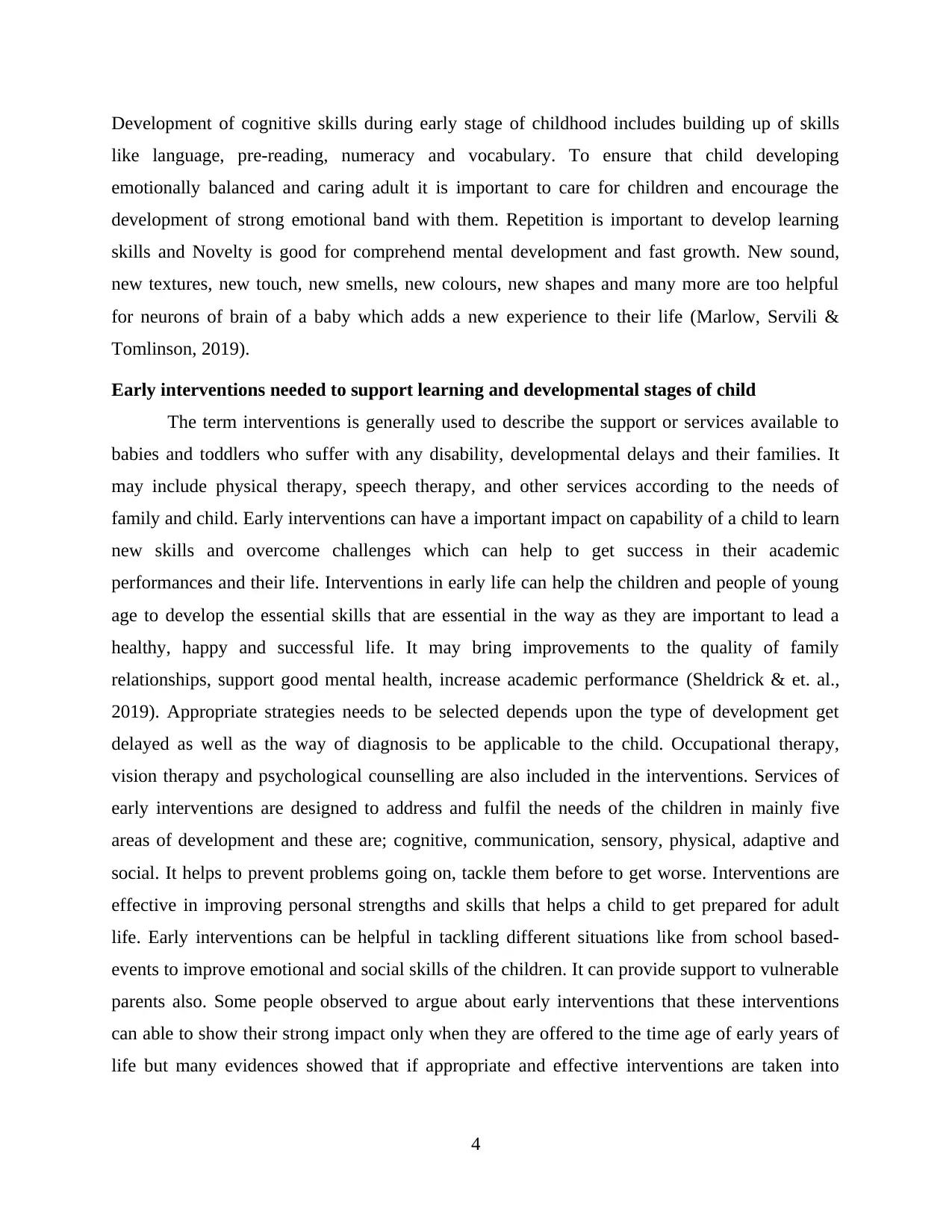
Development of cognitive skills during early stage of childhood includes building up of skills
like language, pre-reading, numeracy and vocabulary. To ensure that child developing
emotionally balanced and caring adult it is important to care for children and encourage the
development of strong emotional band with them. Repetition is important to develop learning
skills and Novelty is good for comprehend mental development and fast growth. New sound,
new textures, new touch, new smells, new colours, new shapes and many more are too helpful
for neurons of brain of a baby which adds a new experience to their life (Marlow, Servili &
Tomlinson, 2019).
Early interventions needed to support learning and developmental stages of child
The term interventions is generally used to describe the support or services available to
babies and toddlers who suffer with any disability, developmental delays and their families. It
may include physical therapy, speech therapy, and other services according to the needs of
family and child. Early interventions can have a important impact on capability of a child to learn
new skills and overcome challenges which can help to get success in their academic
performances and their life. Interventions in early life can help the children and people of young
age to develop the essential skills that are essential in the way as they are important to lead a
healthy, happy and successful life. It may bring improvements to the quality of family
relationships, support good mental health, increase academic performance (Sheldrick & et. al.,
2019). Appropriate strategies needs to be selected depends upon the type of development get
delayed as well as the way of diagnosis to be applicable to the child. Occupational therapy,
vision therapy and psychological counselling are also included in the interventions. Services of
early interventions are designed to address and fulfil the needs of the children in mainly five
areas of development and these are; cognitive, communication, sensory, physical, adaptive and
social. It helps to prevent problems going on, tackle them before to get worse. Interventions are
effective in improving personal strengths and skills that helps a child to get prepared for adult
life. Early interventions can be helpful in tackling different situations like from school based-
events to improve emotional and social skills of the children. It can provide support to vulnerable
parents also. Some people observed to argue about early interventions that these interventions
can able to show their strong impact only when they are offered to the time age of early years of
life but many evidences showed that if appropriate and effective interventions are taken into
4
like language, pre-reading, numeracy and vocabulary. To ensure that child developing
emotionally balanced and caring adult it is important to care for children and encourage the
development of strong emotional band with them. Repetition is important to develop learning
skills and Novelty is good for comprehend mental development and fast growth. New sound,
new textures, new touch, new smells, new colours, new shapes and many more are too helpful
for neurons of brain of a baby which adds a new experience to their life (Marlow, Servili &
Tomlinson, 2019).
Early interventions needed to support learning and developmental stages of child
The term interventions is generally used to describe the support or services available to
babies and toddlers who suffer with any disability, developmental delays and their families. It
may include physical therapy, speech therapy, and other services according to the needs of
family and child. Early interventions can have a important impact on capability of a child to learn
new skills and overcome challenges which can help to get success in their academic
performances and their life. Interventions in early life can help the children and people of young
age to develop the essential skills that are essential in the way as they are important to lead a
healthy, happy and successful life. It may bring improvements to the quality of family
relationships, support good mental health, increase academic performance (Sheldrick & et. al.,
2019). Appropriate strategies needs to be selected depends upon the type of development get
delayed as well as the way of diagnosis to be applicable to the child. Occupational therapy,
vision therapy and psychological counselling are also included in the interventions. Services of
early interventions are designed to address and fulfil the needs of the children in mainly five
areas of development and these are; cognitive, communication, sensory, physical, adaptive and
social. It helps to prevent problems going on, tackle them before to get worse. Interventions are
effective in improving personal strengths and skills that helps a child to get prepared for adult
life. Early interventions can be helpful in tackling different situations like from school based-
events to improve emotional and social skills of the children. It can provide support to vulnerable
parents also. Some people observed to argue about early interventions that these interventions
can able to show their strong impact only when they are offered to the time age of early years of
life but many evidences showed that if appropriate and effective interventions are taken into
4
⊘ This is a preview!⊘
Do you want full access?
Subscribe today to unlock all pages.

Trusted by 1+ million students worldwide
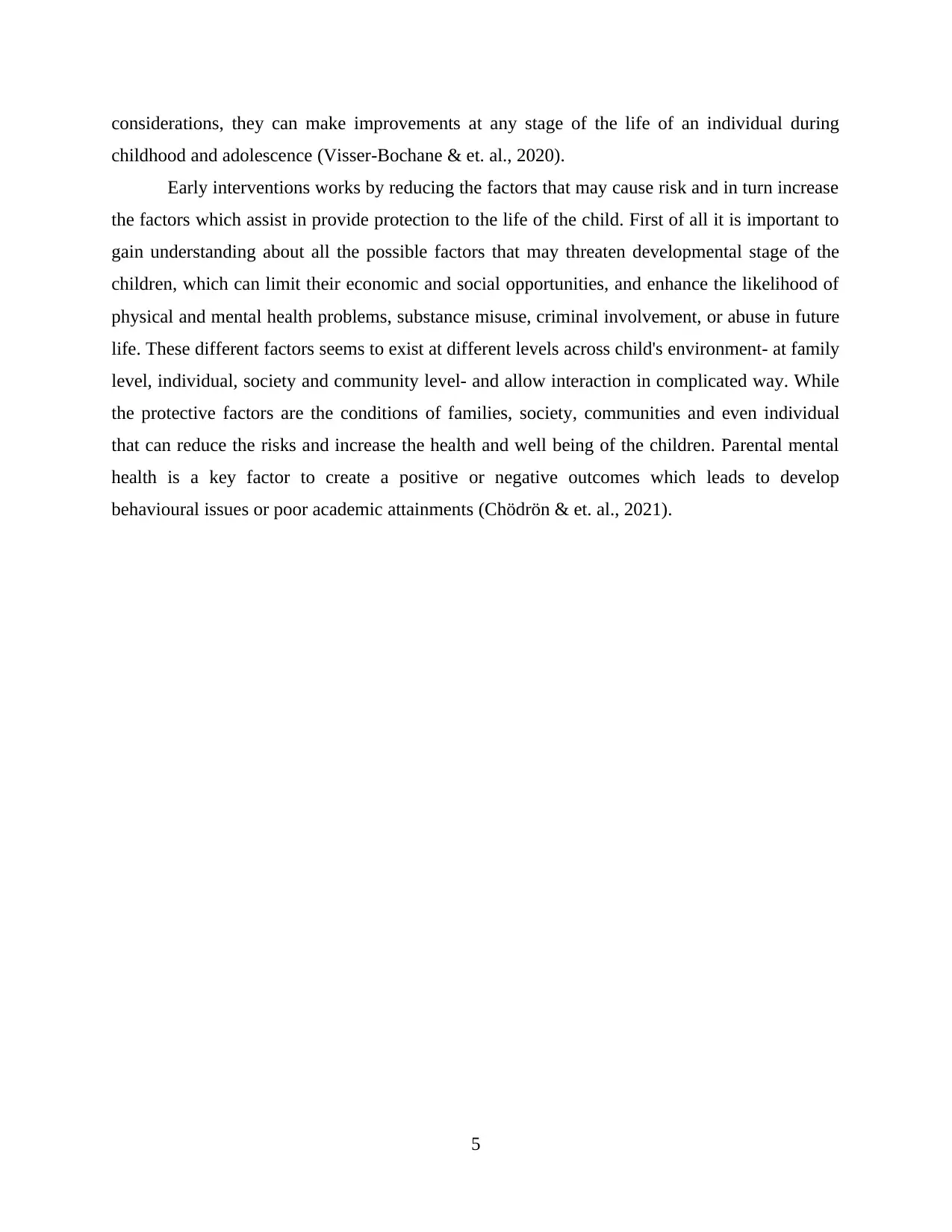
considerations, they can make improvements at any stage of the life of an individual during
childhood and adolescence (Visser-Bochane & et. al., 2020).
Early interventions works by reducing the factors that may cause risk and in turn increase
the factors which assist in provide protection to the life of the child. First of all it is important to
gain understanding about all the possible factors that may threaten developmental stage of the
children, which can limit their economic and social opportunities, and enhance the likelihood of
physical and mental health problems, substance misuse, criminal involvement, or abuse in future
life. These different factors seems to exist at different levels across child's environment- at family
level, individual, society and community level- and allow interaction in complicated way. While
the protective factors are the conditions of families, society, communities and even individual
that can reduce the risks and increase the health and well being of the children. Parental mental
health is a key factor to create a positive or negative outcomes which leads to develop
behavioural issues or poor academic attainments (Chödrön & et. al., 2021).
5
childhood and adolescence (Visser-Bochane & et. al., 2020).
Early interventions works by reducing the factors that may cause risk and in turn increase
the factors which assist in provide protection to the life of the child. First of all it is important to
gain understanding about all the possible factors that may threaten developmental stage of the
children, which can limit their economic and social opportunities, and enhance the likelihood of
physical and mental health problems, substance misuse, criminal involvement, or abuse in future
life. These different factors seems to exist at different levels across child's environment- at family
level, individual, society and community level- and allow interaction in complicated way. While
the protective factors are the conditions of families, society, communities and even individual
that can reduce the risks and increase the health and well being of the children. Parental mental
health is a key factor to create a positive or negative outcomes which leads to develop
behavioural issues or poor academic attainments (Chödrön & et. al., 2021).
5
Paraphrase This Document
Need a fresh take? Get an instant paraphrase of this document with our AI Paraphraser
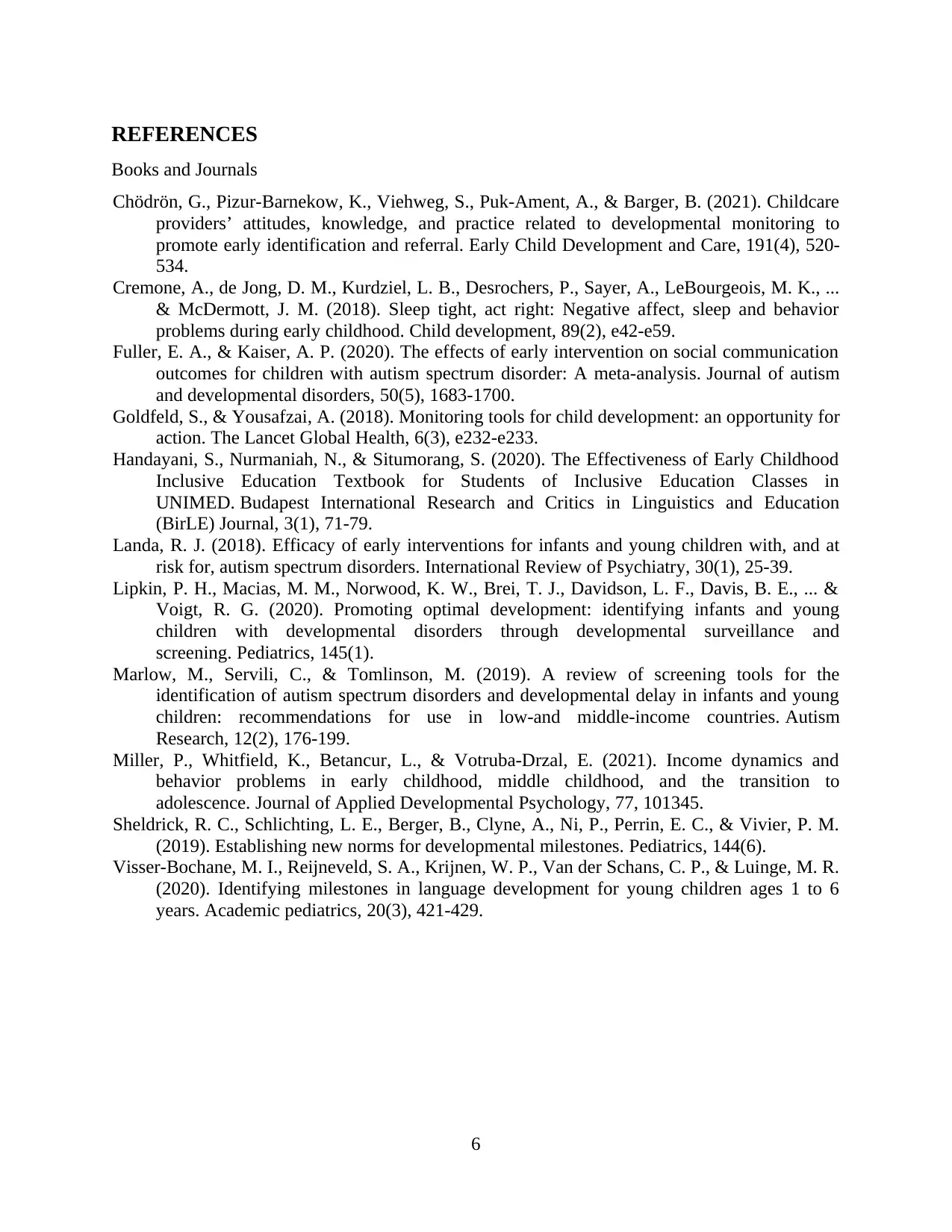
REFERENCES
Books and Journals
Chödrön, G., Pizur-Barnekow, K., Viehweg, S., Puk-Ament, A., & Barger, B. (2021). Childcare
providers’ attitudes, knowledge, and practice related to developmental monitoring to
promote early identification and referral. Early Child Development and Care, 191(4), 520-
534.
Cremone, A., de Jong, D. M., Kurdziel, L. B., Desrochers, P., Sayer, A., LeBourgeois, M. K., ...
& McDermott, J. M. (2018). Sleep tight, act right: Negative affect, sleep and behavior
problems during early childhood. Child development, 89(2), e42-e59.
Fuller, E. A., & Kaiser, A. P. (2020). The effects of early intervention on social communication
outcomes for children with autism spectrum disorder: A meta-analysis. Journal of autism
and developmental disorders, 50(5), 1683-1700.
Goldfeld, S., & Yousafzai, A. (2018). Monitoring tools for child development: an opportunity for
action. The Lancet Global Health, 6(3), e232-e233.
Handayani, S., Nurmaniah, N., & Situmorang, S. (2020). The Effectiveness of Early Childhood
Inclusive Education Textbook for Students of Inclusive Education Classes in
UNIMED. Budapest International Research and Critics in Linguistics and Education
(BirLE) Journal, 3(1), 71-79.
Landa, R. J. (2018). Efficacy of early interventions for infants and young children with, and at
risk for, autism spectrum disorders. International Review of Psychiatry, 30(1), 25-39.
Lipkin, P. H., Macias, M. M., Norwood, K. W., Brei, T. J., Davidson, L. F., Davis, B. E., ... &
Voigt, R. G. (2020). Promoting optimal development: identifying infants and young
children with developmental disorders through developmental surveillance and
screening. Pediatrics, 145(1).
Marlow, M., Servili, C., & Tomlinson, M. (2019). A review of screening tools for the
identification of autism spectrum disorders and developmental delay in infants and young
children: recommendations for use in low‐and middle‐income countries. Autism
Research, 12(2), 176-199.
Miller, P., Whitfield, K., Betancur, L., & Votruba-Drzal, E. (2021). Income dynamics and
behavior problems in early childhood, middle childhood, and the transition to
adolescence. Journal of Applied Developmental Psychology, 77, 101345.
Sheldrick, R. C., Schlichting, L. E., Berger, B., Clyne, A., Ni, P., Perrin, E. C., & Vivier, P. M.
(2019). Establishing new norms for developmental milestones. Pediatrics, 144(6).
Visser-Bochane, M. I., Reijneveld, S. A., Krijnen, W. P., Van der Schans, C. P., & Luinge, M. R.
(2020). Identifying milestones in language development for young children ages 1 to 6
years. Academic pediatrics, 20(3), 421-429.
6
Books and Journals
Chödrön, G., Pizur-Barnekow, K., Viehweg, S., Puk-Ament, A., & Barger, B. (2021). Childcare
providers’ attitudes, knowledge, and practice related to developmental monitoring to
promote early identification and referral. Early Child Development and Care, 191(4), 520-
534.
Cremone, A., de Jong, D. M., Kurdziel, L. B., Desrochers, P., Sayer, A., LeBourgeois, M. K., ...
& McDermott, J. M. (2018). Sleep tight, act right: Negative affect, sleep and behavior
problems during early childhood. Child development, 89(2), e42-e59.
Fuller, E. A., & Kaiser, A. P. (2020). The effects of early intervention on social communication
outcomes for children with autism spectrum disorder: A meta-analysis. Journal of autism
and developmental disorders, 50(5), 1683-1700.
Goldfeld, S., & Yousafzai, A. (2018). Monitoring tools for child development: an opportunity for
action. The Lancet Global Health, 6(3), e232-e233.
Handayani, S., Nurmaniah, N., & Situmorang, S. (2020). The Effectiveness of Early Childhood
Inclusive Education Textbook for Students of Inclusive Education Classes in
UNIMED. Budapest International Research and Critics in Linguistics and Education
(BirLE) Journal, 3(1), 71-79.
Landa, R. J. (2018). Efficacy of early interventions for infants and young children with, and at
risk for, autism spectrum disorders. International Review of Psychiatry, 30(1), 25-39.
Lipkin, P. H., Macias, M. M., Norwood, K. W., Brei, T. J., Davidson, L. F., Davis, B. E., ... &
Voigt, R. G. (2020). Promoting optimal development: identifying infants and young
children with developmental disorders through developmental surveillance and
screening. Pediatrics, 145(1).
Marlow, M., Servili, C., & Tomlinson, M. (2019). A review of screening tools for the
identification of autism spectrum disorders and developmental delay in infants and young
children: recommendations for use in low‐and middle‐income countries. Autism
Research, 12(2), 176-199.
Miller, P., Whitfield, K., Betancur, L., & Votruba-Drzal, E. (2021). Income dynamics and
behavior problems in early childhood, middle childhood, and the transition to
adolescence. Journal of Applied Developmental Psychology, 77, 101345.
Sheldrick, R. C., Schlichting, L. E., Berger, B., Clyne, A., Ni, P., Perrin, E. C., & Vivier, P. M.
(2019). Establishing new norms for developmental milestones. Pediatrics, 144(6).
Visser-Bochane, M. I., Reijneveld, S. A., Krijnen, W. P., Van der Schans, C. P., & Luinge, M. R.
(2020). Identifying milestones in language development for young children ages 1 to 6
years. Academic pediatrics, 20(3), 421-429.
6

7
⊘ This is a preview!⊘
Do you want full access?
Subscribe today to unlock all pages.

Trusted by 1+ million students worldwide
1 out of 9
Related Documents
Your All-in-One AI-Powered Toolkit for Academic Success.
+13062052269
info@desklib.com
Available 24*7 on WhatsApp / Email
![[object Object]](/_next/static/media/star-bottom.7253800d.svg)
Unlock your academic potential
Copyright © 2020–2026 A2Z Services. All Rights Reserved. Developed and managed by ZUCOL.





